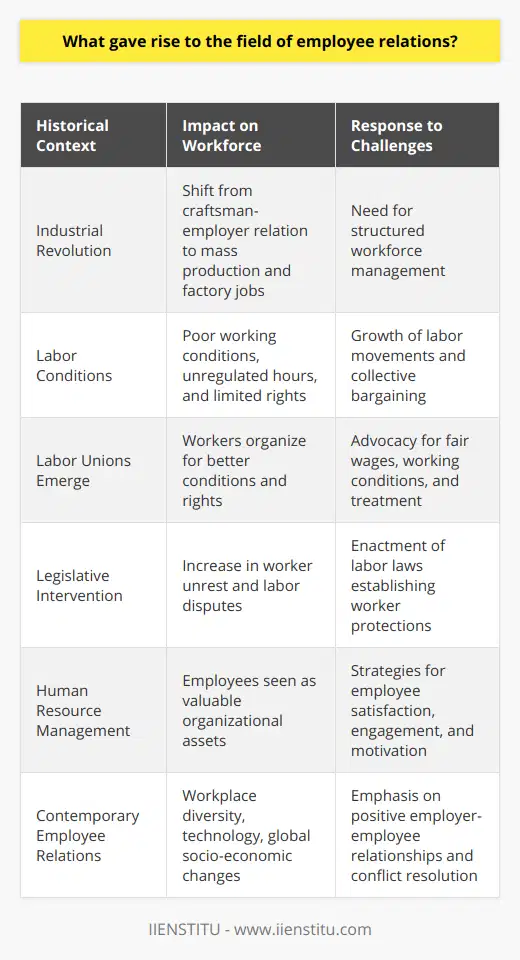
There has been a recent shift in the role of HRM within organizations. Traditionally, human resources management was responsible for administering employee benefits and ensuring compliance with employment law. However, in recent years, the role of HRM has shifted to focus more on developing and maintaining positive employee relations.
This shift is due in part to the changing workforce, which is now more diverse and mobile than ever before. In order to keep up with these changes, organizations are realizing the importance of having a strong HR department that can effectively manage employee relations.
The role of employee relations in HRM
Employee relations is an important aspect of HRM. It includes the ways in which HRM practitioners interact with employees, as well as the policies and procedures that govern those interactions. Employee relations also encompasses the employee experience, from recruitment and onboarding to performance management and career development.
By establishing and maintaining positive employee relations, HRM practitioners can create a more engaged and productive workforce. In turn, this can lead to improved organizational performance and better business outcomes.
The changing landscape of employee relations
Employee relations is a broad term that encompasses the various ways in which employees interact with their employers. In recent years, there has been a shift in the landscape of employee relations, as more and more employees are working remotely. This change has brought with it both benefits and challenges.
On the one hand, remote work can promote a better work-life balance and provide employees with greater flexibility. On the other hand, it can make it difficult to build strong working relationships and can lead to feelings of isolation. As the workplace continues to evolve, it will be interesting to see how employee relations continue to change.
How to manage employee relations effectively
Employee relations is a broad term that encompasses many different aspects of the employer-employee relationship. In order to manage employee relations effectively, employers need to be aware of the different factors that can affect the relationship. These include communication, trust, respect, and conflict resolution. By taking the time to foster a positive work environment and build strong relationships with employees, employers can create a more productive and enjoyable workplace for everyone.
One of the most important things that employers can do to manage employee relations effectively is to communicate openly and frequently with employees. This includes letting employees know about changes in company policy or updates to the job description. It also involves regularly seeking feedback from employees about their job satisfaction and how they feel the company is doing overall. When employees feel like they are being kept in the loop, they are more likely to trust and respect their employer.
Another key element of effective employee relations management is conflict resolution. Conflict is inevitable in any workplace, but it doesn't have to be destructive. By handling conflict in a constructive way, employers can help to improve communication and build trust between employees. When conflicts are resolved quickly and fairly, employees are more likely to feel respected and valued by their employer.
By taking the time toCommunicate openly with employees on a regular basis seek feedback from them on job satisfaction levels, companies can go a long way towards establishing strong employee relations. A positive work environment and strong relationships between employees and employers lead to a more productive and enjoyable workplace for everyone involved.
Benefits of strong employee relations
Employee relations is the area of HR that looks after the well-being of employees and deals with workplace issues. A strong employee relations function ensures that employees are happy and productive, which in turn positively impacts the bottom line. There are many benefits to having strong employee relations, including reducing turnover, improving communication, and fostering a positive work environment.
When employee relations is strong, employees feel valued and appreciated, which leads to higher levels of motivation and engagement. This results in lower levels of absenteeism and presenteeism, as well as higher levels of productivity. Strong employee relations also leads to improved communication, which can prevent misunderstandings and conflict.
Finally, a positive work environment fosters creativity and innovation, which can benefit the company as a whole. Therefore, it is evident that there are many advantages to having strong employee relations.
Challenges faced by employers when it comes to employee relations
Employee relations can be a challenge for any employer. After all, it is the employer's responsibility to ensure that their employees are treated fairly and with respect. However, employers must also balance this with the need to maintain a productive workplace. Employee relations can be further complicated by the fact that employees may have different backgrounds and opinions. This can make it difficult to create a cohesive work environment.
Additionally, Employment law is constantly changing, making it hard for employers to keep up with the latest requirements. In order to effectively manage employee relations, employers need to have a clear understanding of both the law and the needs of their employees.
Tips for building positive relationships with employees
As a manager, one of your most important responsibilities is to build positive relationships with your employees. There are many benefits to having a good relationship with your staff, including increased productivity and morale, and reduced turnover. Here are some tips for building positive relationships with your employees:
Get to know them as people. Take an interest in their lives outside of work. Ask about their families, hobbies, and passions.
Communicate regularly and openly. Let them know what your expectations are, and give them regular feedback on their performance. Encourage open communication by creating an environment where employees feel comfortable speaking up.
Be fair and consistent in your treatment of employees. Show that you are committed to principles of fairness and equality in the workplace.
Respect their time and boundaries. Avoid putting employees in uncomfortable situations or making unreasonable demands on their time.
Support their professional development. Help them to identify their goals and provide opportunities for them to grow professionally.
By following these tips, you can build positive relationships with your employees that will benefit both you and them.
You should now have a good understanding of the role employee relations plays in HRM, how it has changed over time and how you can manage it effectively. Strong employee relations are beneficial to both employers and employees and so it is important to try to build positive relationships.
Although there can be challenges when managing employee relations, by following the tips mentioned earlier, you can overcome these obstacles. If you would like to learn more about HR management, join our course today!
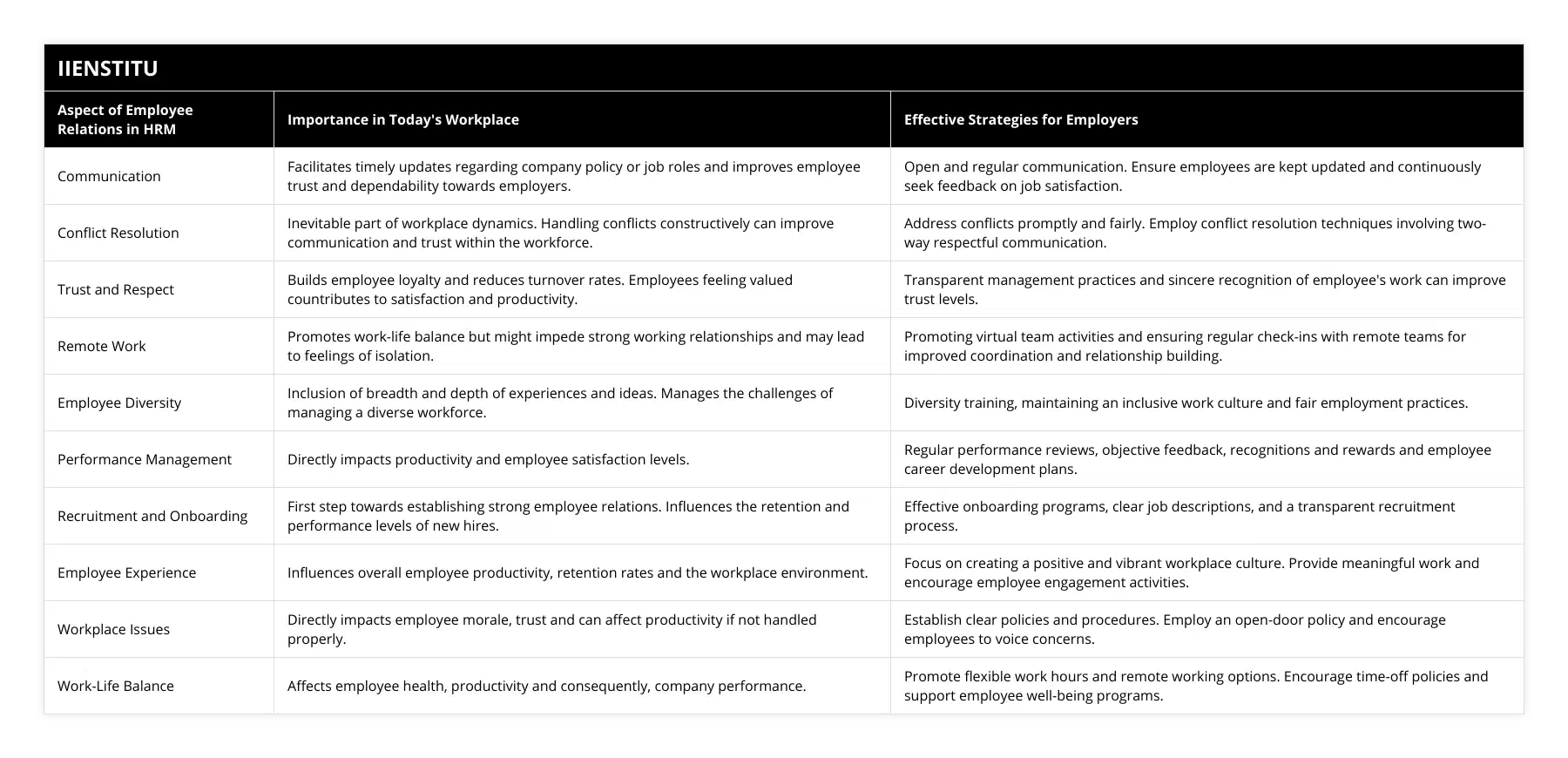
Frequently Asked Questions
What is employee relations?
Employee relations are the relationships between an employer and its employees. These relationships are important because they affect employee morale, productivity, and commitment to the organization. Employee relations also play a role in an organization's ability to attract and retain talent. The term "employee relations" encompasses a wide range of issues, including pay, benefits, working conditions, job satisfaction, and unionization. While employers and employees may not always see eye to eye on these issues, effective communication and negotiation can help to resolve disagreements and create a more positive work environment. In addition, employers should strive to create policies and procedures that are fair and consistent for all employees. By investing in employee relations, employers can create a more positive work environment and improve overall organizational performance.
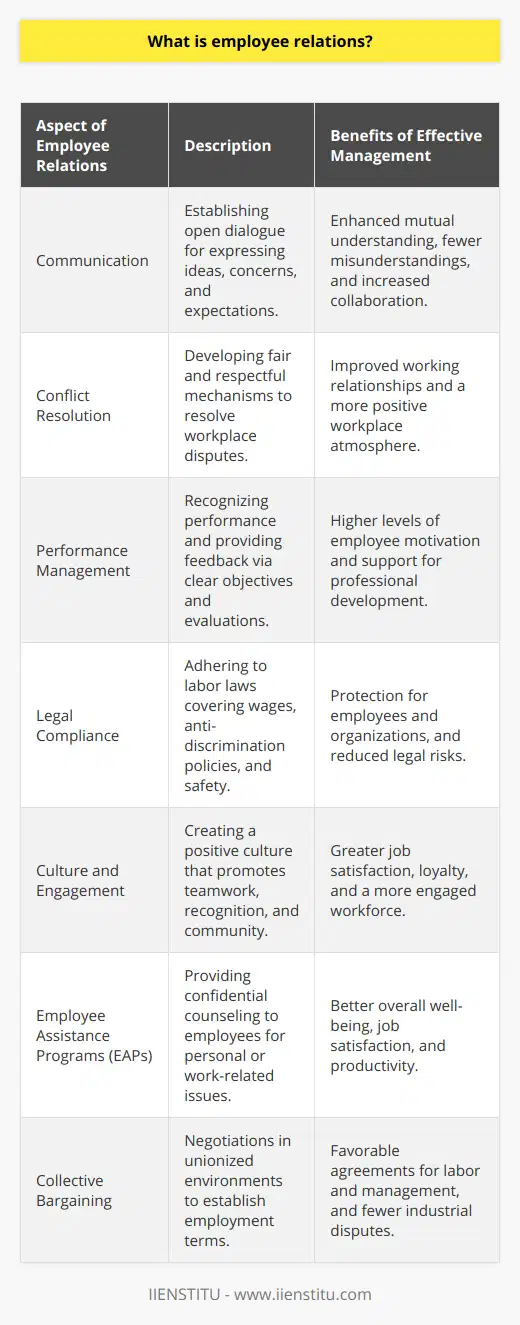
What are the benefits of employee relations?
The field of employee relations is concerned with maintaining a positive relationship between employees and their employer. This can involve ensuring that employees are treated fairly and equally, providing support during times of conflict, and offering guidance on best practices for effective communication. By fostering a positive relationship between employees and their employer, employee relations can help to create a more productive and positive work environment. In turn, this can lead to increased job satisfaction, improved performance, and reduced absenteeism. Additionally, positive employee relations can help to build trust and loyalty among employees, which can translate into higher levels of customer satisfaction. Ultimately, the goal of employee relations is to create an environment in which everyone benefits - both the employees and the employer.
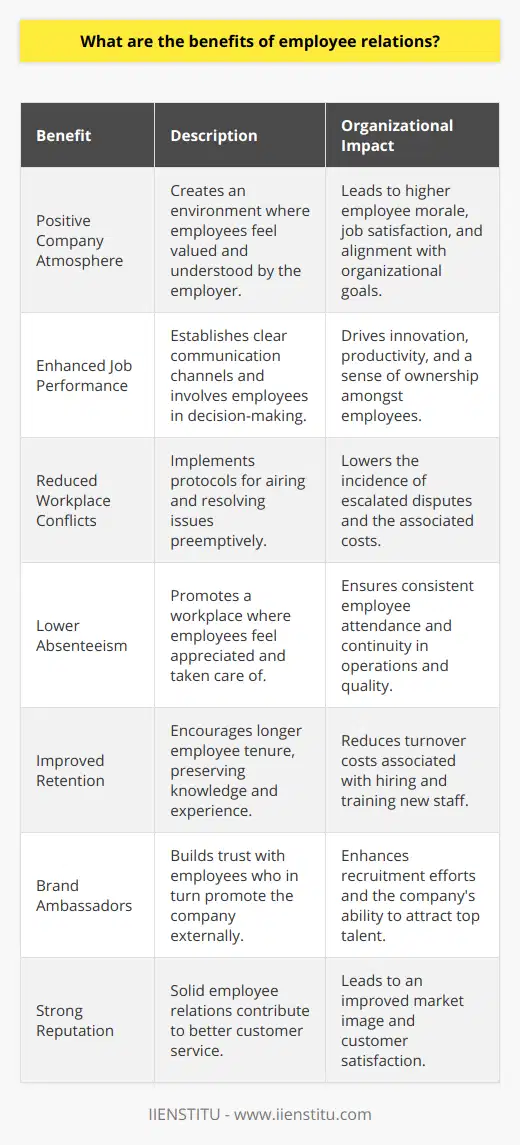
How can employee relations be improved?
Employee relations is the term used to describe the relationship between employees and management. Strong employee relations are essential for any business or organization, as they promote a feeling of trust and cooperation. There are many ways to improve employee relations, but some of the most effective include: providing regular feedback, promoting open communication, offering opportunities for training and professional development, and recognizing achievements. By taking steps to improve employee relations, businesses can create a positive work environment that leads to higher productivity and motivation.
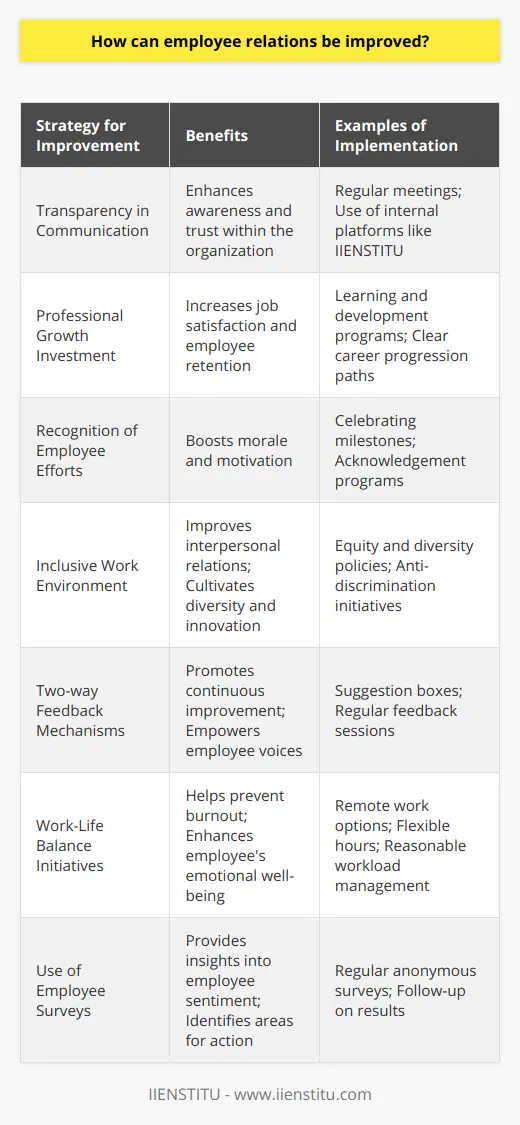
How can HR managers ensure effective employee relations in their organization?
Create an open and constructive dialogue between employees and management.
Develop and implement effective policies to ensure fairness and consistency.
Encourage employee feedback and solicit input from employees on issues that affect them.
Promote a positive work environment by recognizing and rewarding employees for their contributions.
Provide regular opportunities for employees to engage in team building activities.
Invest in training and professional development opportunities for employees.
Address employee grievances promptly and fairly.
Foster a culture of respect and appreciation for the contributions of all employees.
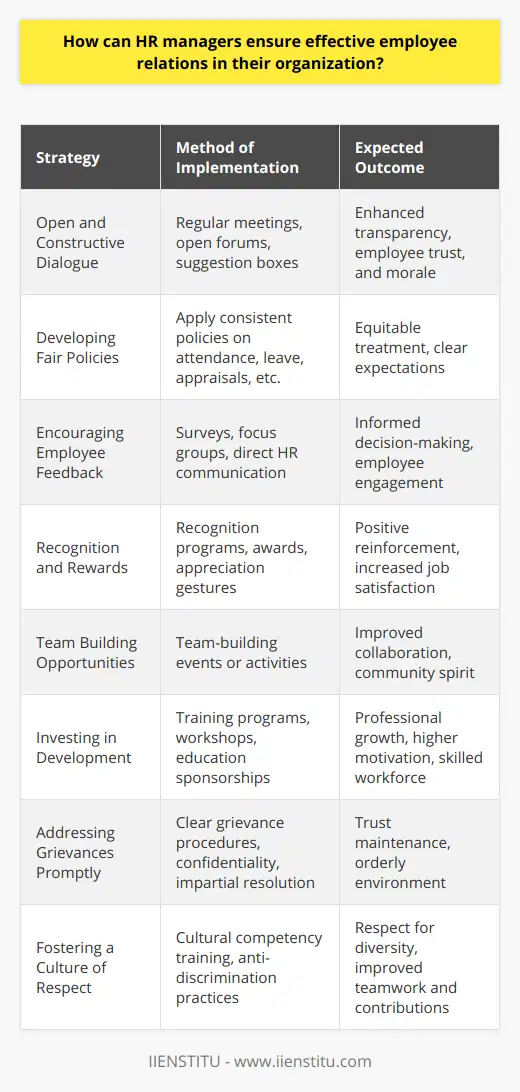
What strategies can be used to maintain positive employee relations?
Implement open communication – Encourage employees to speak up and provide feedback to ensure that all voices are heard.
Promote collaboration – Encourage employees to work together, share ideas, and collaborate on projects.
Recognize employees – Show appreciation for employees’ hard work and offer rewards for good performance.
Provide development opportunities – Offer training and development opportunities to help employees grow and develop their skills.
Foster a positive work environment – Create an atmosphere of respect, trust, and camaraderie.
Ensure fair and equitable treatment – Make sure that all employees receive equal treatment, regardless of their gender, race, or other characteristics.
Encourage work-life balance – Provide flexible work schedules and support employees’ personal lives.
Foster relationships – Encourage employees to build relationships and get to know one another.
Celebrate team successes – Celebrate team successes and recognize individual contributions.

What challenges can arise when managing employee relations?
Poor communication: Poor communication between management and employees can create tension, frustration, and mistrust.
Unclear expectations: Without clear expectations and guidelines, employees may become confused or frustrated.
Lack of trust: Employees may feel that management does not trust them, or that they are not valued, which can lead to feelings of resentment.
Poor job satisfaction: If employees are not satisfied with their job and working conditions, they may become disengaged and unmotivated.
Unresolved conflicts: Unresolved conflicts between employees can lead to disruptions in the workplace.
Unfair treatment: If employees feel that they are being treated unfairly, they may become dissatisfied and unmotivated.
Unbalanced workloads: Unequal workloads can lead to frustration and resentment among employees.
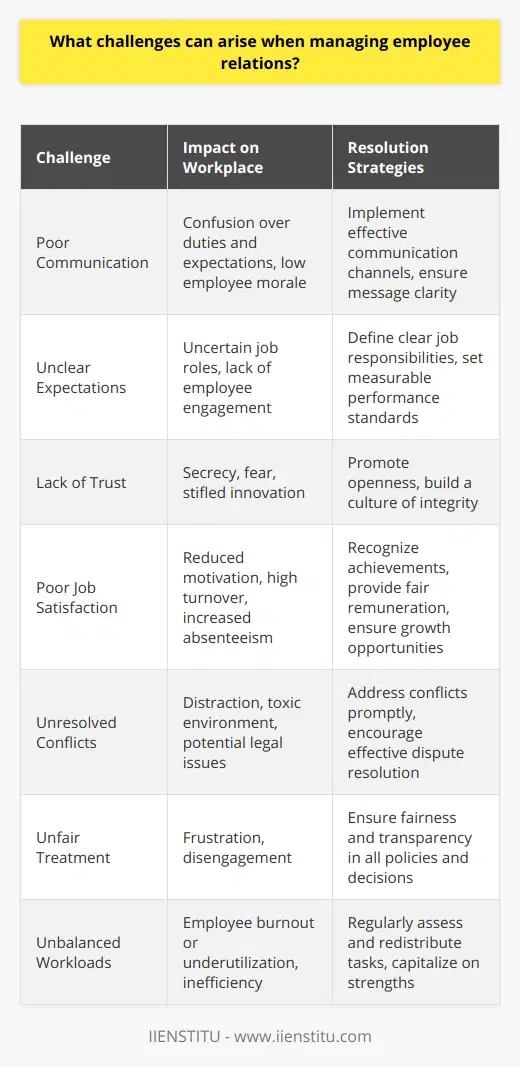
Why is employee relations important in HRM?
Significance of Employee Relations
Employee relations is a crucial aspect of human resource management (HRM), as it fosters a positive work environment and contributes to overall organizational success. By building strong relationships with employees, HRM can address the needs, concerns, and expectations of the workforce. This ultimately leads to increased job satisfaction, productivity, and employee retention, which are essential elements for a thriving organization.
Role of Communication
One of the core components of employee relations is effective communication. By establishing open channels, HR professionals can more accurately assess employee needs and take appropriate actions to address issues. Additionally, clear communication helps to prevent misunderstandings and ensures that employees have a comprehensive understanding of the organization's goals, policies, and expectations. As a result, employees feel more engaged and empowered, leading to increased loyalty and commitment.
Conflict Resolution
Workplace conflicts are inevitable, but proper employee relations practices can mitigate their impact on productivity and morale. HRM should be well-equipped to mediate disputes and create amicable solutions that promote harmony among coworkers. By taking preventative measures and addressing conflicts proactively, HRM can maintain a cohesive and united workforce, preventing disruptions and enhancing overall performance.
Recognition and Reward System
Acknowledgment of employee achievements is vital for maintaining motivation and engagement. An effective HRM team should establish a recognition and reward system that celebrates the accomplishments of staff members. By providing incentives and acknowledging hard work, employees will feel valued and appreciated, which reinforces their dedication to the organization.
Work-Life Balance Encouragement
Employee relations is also important in promoting a healthy work-life balance. HRM should implement policies and programs that support employees' well-being, such as flexible work arrangements and stress management initiatives. By addressing the holistic needs of staff members, HRM can foster a happier and more resilient workforce, ultimately driving the organization's success.
In conclusion, employee relations is a critical function in HRM as it directly affects the overall performance and satisfaction of workers. By prioritizing communication, conflict resolution, recognition, and work-life balance, HRM can cultivate a thriving work environment that engenders commitment and loyalty from its employees. Investing in strong employee relations is a strategic decision that benefits the entire organization in the long run.
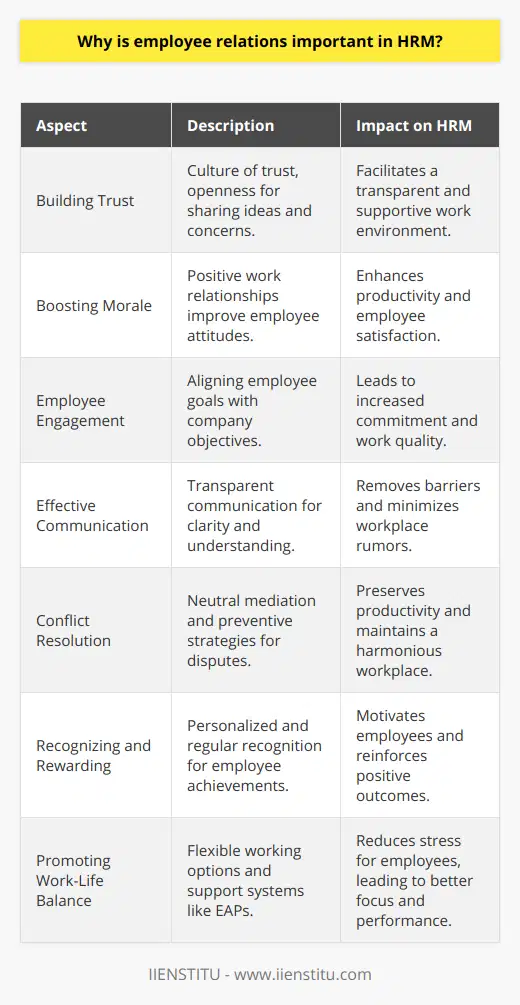
What is the importance of employee relations in respect to influencing HRM decision making?
Significance of Employee Relations in HRM Decision Making
Understanding Employees' Perspectives
Employee relations play a crucial role in shaping Human Resources Management (HRM) decisions as it facilitates the comprehension of employees’ perspectives. It enables organizations to understand the needs, aspirations, and concerns of the workforce, providing valuable insights for HRM policies and actions.
Enhancing Motivation and Engagement
A strong employee relations system positively influences motivation and engagement, leading to a more committed and satisfied workforce. HRM can leverage this to create better performance management, rewards, and benefits programs that cater to employee preferences and expectations, ultimately enhancing productivity and company performance.
Reducing Conflicts and Misunderstandings
Effective employee relations contribute to reducing workplace conflicts and misunderstandings arising from communication gaps and unaddressed grievances. HRM decision-making can benefit from this by addressing employee concerns through continuous dialogue, feedback mechanisms, and fostering a culture of openness and trust.
Fostering Workforce Diversity
Employee relations play a pivotal role in promoting diversity and inclusion in the workplace. HRM decision-making can align with this objective by implementing recruitment, training, and development policies that support and nurture a diverse workforce, fostering an environment where employees feel valued, respected, and included.
Improving Employee Retention
Positive employee relations impact employee retention, as satisfied employees tend to stay with the organization longer. By understanding the drivers of employee satisfaction, HRM can make informed decisions on career development, learning opportunities, and work-life balance policies to retain top talent.
Promoting Regulatory Compliance
Finally, sound employee relations ensure compliance with labor laws and regulations, safeguarding the organization’s interests and reputation. HRM can devise policies and procedures that uphold legal requirements while promoting a fair and ethical work environment.
In conclusion, employee relations significantly influence HRM decision-making by offering insights into employee needs and aspirations, enhancing motivation, reducing conflicts, fostering workforce diversity, improving retention, and ensuring regulatory compliance. By prioritizing positive employee relations, organizations can create a more engaged, productive, and loyal workforce that contributes to overall business success.
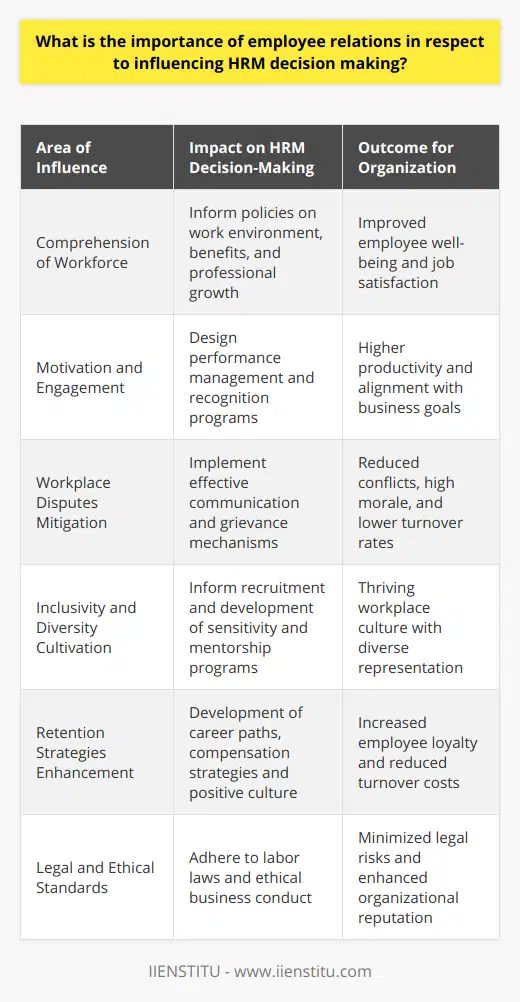
How do employee relations contribute to the overall success and effectiveness of an organization?
The Role of Employee Relations
Employee relations play a crucial role in shaping an organization's overall success and effectiveness. One way is by fostering a positive work environment, as satisfied employees are more likely to be productive and engaged in their work. They tend to take ownership of their roles, demonstrate greater commitment, and contribute significantly to achieving the organization's objectives.
Enhanced Communication and Collaboration
Effective employee relations enable an organization to facilitate open and transparent communication among its workforce. This encourages the exchange of ideas, knowledge sharing, and innovative problem-solving, contributing to the organization's adaptability and continued development. Additionally, a culture of collaboration promotes cooperation among employees across different functions, ultimately improving the efficiency and quality of the work output.
Reduced Conflict and Greater Retention
Proactively managing employee relations minimizes workplace conflicts by addressing disputes and grievances in a timely and fair manner. This leads to an environment in which employees feel valued, respected, and heard, resulting in higher job satisfaction and reduced turnover. Retaining highly skilled and experienced employees offers a competitive advantage, as the organization benefits from their expertise and knowledge, and it also avoids the high costs associated with recruiting, onboarding, and training new staff.
Increased Motivation and Performance
Well-established employee relations contribute to increased motivation and enhanced performance. Organizations that actively implement policies and practices that ensure the well-being of their employees, such as fair compensation, work-life balance, and equal opportunities, achieve higher employee morale. In turn, motivated employees are more likely to take initiative, go above and beyond to excel in their roles, and maintain high levels of performance, driving the organization forward.
In conclusion, positive employee relations foster a collaborative, respectful, and motivated work environment, where employees feel valued, empowered, and committed to their roles. This leads to increased productivity, improved efficiency, and enhanced overall performance, contributing significantly to an organization's success and effectiveness.
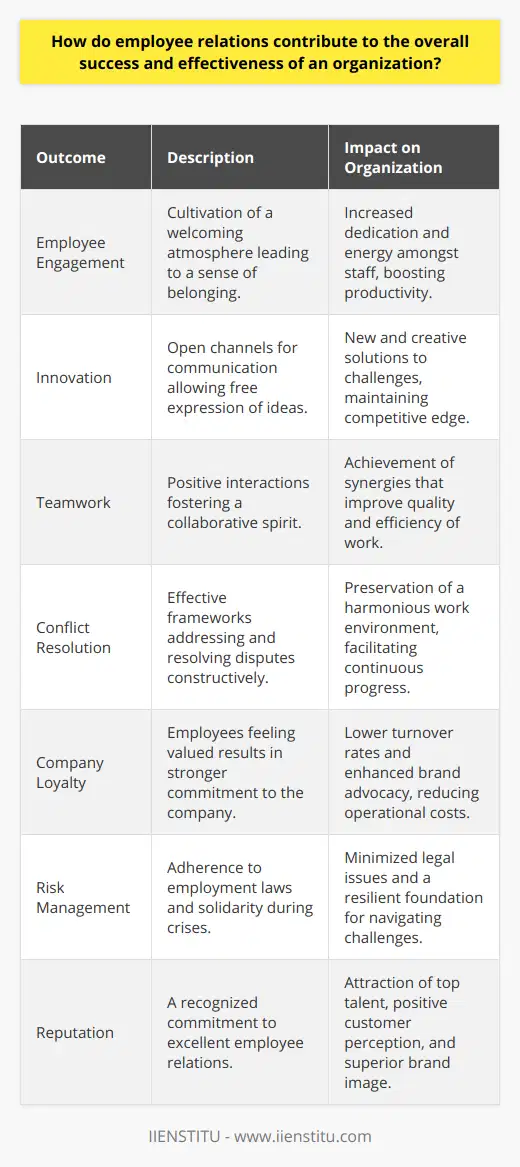
How does the HRM's role in employee relations impact organizational culture?
HRM's Role in Employee Relations
The Human Resource Management (HRM) department plays a critical role in fostering employee relations and, in turn, shaping organizational culture. As the primary liaison between employees and management, HRM is responsible for implementing policies, practices, and initiatives that drive individual and collective behavior within the organization.
Fostering Effective Communication
One way HRM impacts organizational culture is by fostering effective communication among employees and management. By providing channels for open dialogue, HRM helps create an environment where employees feel valued, heard, and engaged in decision-making processes. This sense of involvement contributes to a positive culture where employee input is respected and valued.
Promoting Diversity and Inclusion
Another aspect of HRM's role in employee relations is promoting diversity and inclusion within the workforce. By implementing policies and initiatives aimed at increasing diversity within the organization, HRM helps create an inclusive culture where individuals from different backgrounds can thrive. This, in turn, encourages collaboration, innovation, and creativity among employees, further enhancing the organization's culture.
Addressing Employee Concerns
HRM also plays a significant role in addressing employee concerns and resolving conflicts. By providing employees with the appropriate mechanisms to voice their grievances, HRM helps maintain a healthy working environment where conflicts are addressed promptly and effectively. As the organization's culture is heavily influenced by employees' perceptions of fairness and conflict resolution, HRM's involvement in this process is crucial to fostering a positive and collaborative culture.
Recognizing and Rewarding Performance
Lastly, HRM is responsible for designing and implementing employee recognition and reward systems that not only motivate employees but also create a culture of continuous improvement. By acknowledging employees' achievements and contributions to the organization, HRM promotes a merit-based culture that encourages high performance and employee engagement. As employees feel valued for their hard work, they are likely to develop a deeper commitment to the organization and maintain a positive attitude towards their work.
Overall, the HRM department plays an essential role in shaping organizational culture through its strategic role in employee relations. By fostering effective communication, promoting diversity and inclusion, addressing employee concerns, and recognizing and rewarding performance, HRM contributes to a positive and supportive work environment that enables employees to thrive and perform at their best.
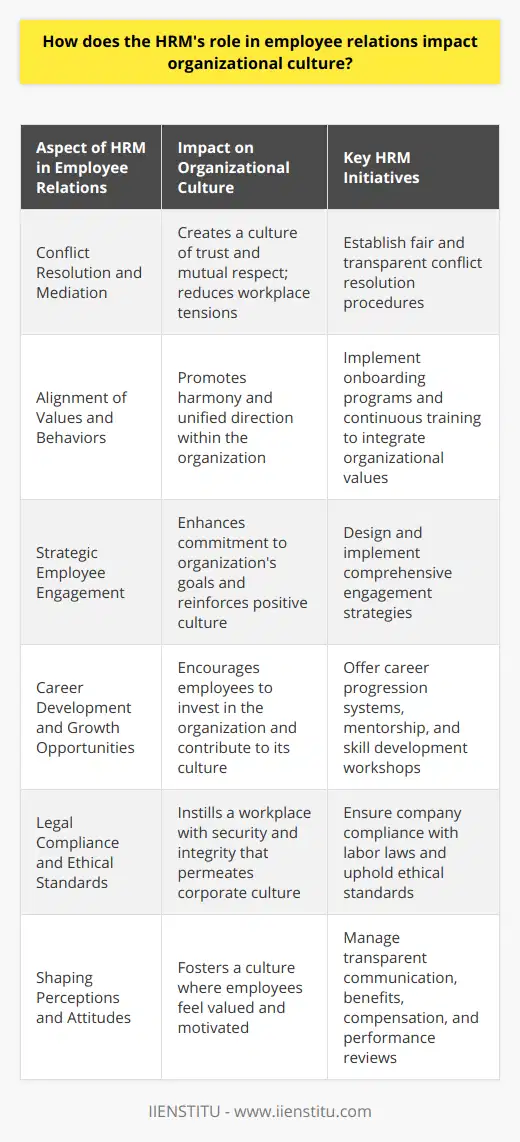
In what ways does HRM approach to employee relations affect employee engagement and retention?
Impact on Employee Engagement
One significant way that the HRM approach to employee relations affects employee engagement is through creating a positive organizational climate. This is achieved by promoting open communication, recognition of employees' efforts, and providing career development opportunities. When employees feel valued and heard, their dedication and commitment towards their job are increased, leading to a higher level of engagement.
Supporting Work-life Balance
Another factor influencing employee engagement and retention is the implementation of policies that promote a healthy work-life balance. HRM practices such as flexible work hours, remote working options, and overall support for employees' personal needs can significantly impact their satisfaction and commitment levels. An optimal work-life balance not only increases employees' engagement but also leads to a reduction in job-related stress, which in turn fosters employee retention.
Performance Management and Feedback
The use of performance management systems and regular feedback is another crucial HRM approach to employee relations. By setting clear expectations for employees, offering regular evaluations of their performance, and providing constructive feedback, HRM can drive a culture of continuous improvement. This performance-driven culture not only encourages employee engagement but also supports the retention of high performers within the organization.
Training and Development Opportunities
Offering training and development programs is an essential HRM practice that fosters employee engagement and retention. By investing in employee growth, organizations can not only enhance their workforce's skill set but also demonstrate their commitment to the employees' career progression. Providing development opportunities creates a sense of loyalty and motivation among employees, making them more likely to stay with the organization.
Inclusion and Diversity Initiatives
One often overlooked aspect of HRM's approach to employee relations is the promotion of inclusion and diversity within the organization. By ensuring that employees feel valued, irrespective of their gender, race, or ethnicity, HRM can foster a nurturing work culture. This inclusive environment not only bolsters employee engagement but also positively impacts retention rates, as employees feel a genuine sense of belonging within the organization.
In conclusion, HRM's approach to employee relations plays a vital role in enhancing employee engagement and retention. By promoting a positive organizational climate, supporting work-life balance, implementing performance management systems, offering training opportunities, and fostering an inclusive work culture, HRM can significantly impact employees' satisfaction and commitment levels.
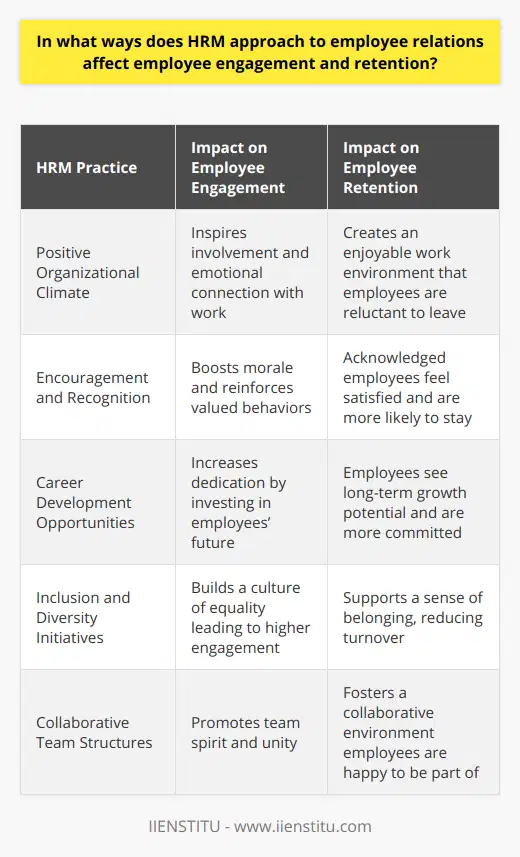
How do effective employee relations contribute to mitigating potential employee-related risks and crises within an organization?
**Effective Communication**
Effective employee relations play a pivotal role in mitigating potential employee-related risks and crises within an organization. Clear communication channels facilitate better understanding of expectations and help avoid misinterpretations that can lead to conflicts. When employees feel heard, they are more likely to share concerns or potential problems in the early stages, thereby preventing crises from escalating.
**Conflict Resolution**
Employee relations contribute to the proactive resolution of conflicts and disagreements that may arise in the workplace. By investing in the prompt and fair handling of such situations, organizations can prevent these issues from escalating and adversely impacting employee morale, productivity, and even legal liabilities. Additionally, when conflict resolution is handled effectively, it can serve as a learning opportunity for all stakeholders, fostering a culture of continuous improvement and open dialogue.
**Training and Development**
Providing employees with adequate training, development, and resources leads to improved performance and reduces the likelihood of errors that may result in unforeseen consequences or workplace crises. It also helps equip employees with the necessary tools to manage their tasks and responsibilities. By investing in professional development, organizations can mitigate potential risks associated with inadequate employee performance, ensuring a competent and skilled workforce.
**Promoting an Inclusive Culture**
An inclusive work environment fosters positive employee relations and helps mitigate potential risks associated with discrimination or harassment. Ensuring that diversity and inclusion are valued in the organization creates a sense of belonging, promoting a positive work culture. This, in turn, can help reduce turnover, boost morale, and support the overall well-being of employees, minimizing the likelihood of risk and crises associated with negative workplace behaviors.
**Recognizing and Rewarding Performance**
Acknowledging, recognizing, and rewarding employee performance reinforces the importance of meeting or exceeding performance standards, thus contributing to risk mitigation. By providing timely feedback and acknowledging employees’ efforts, organizations can prevent apathy or disengagement, which can lead to inadvertent or deliberate negligence. Recognizing achievements and rewarding employees also strengthens their loyalty and commitment to the organization, further contributing to a culture of accountability and responsibility.
In conclusion, effective employee relations are vital to mitigating potential employee-related risks and crises within an organization. Strategies such as fostering communication, addressing conflicts proactively, investing in training and development, promoting an inclusive culture, and recognizing employees' efforts provide a solid foundation for maintaining positive relationships, improving performance, and minimizing risks in the workplace.
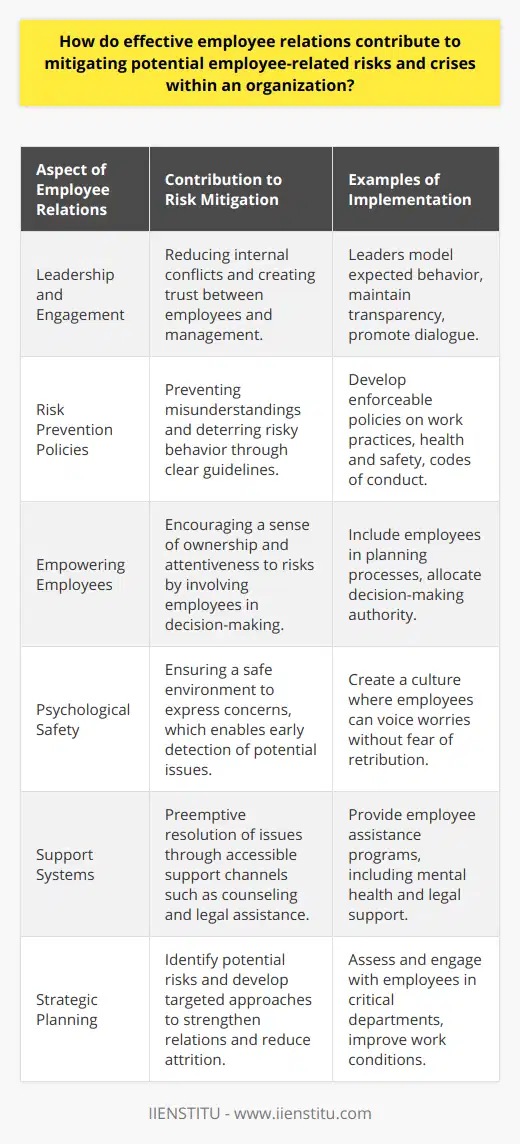
What is the role of HRM in fostering a healthy employee relations climate within an organization?
**Role of HRM in Employee Relations**
The role of Human Resource Management (HRM) in fostering a healthy employee relations climate within an organization is essential. HRM focuses on various aspects of employment, which include recruitment, development, and retention. A key component of effective HRM is fostering healthy relationships between employees and management to create a positive work environment.
**Conflict Prevention and Resolution**
One of the primary aspects of HRM's role in employee relations is conflict prevention. By identifying potential issues early on and addressing them proactively, HRM can minimize conflict and create a harmonious work environment. In cases where disputes do arise, HRM is responsible for mediating and resolving conflicts between employees and managers. This helps to maintain a healthy working relationship between all parties.
**Performance Management and Feedback**
Another critical facet of HRM's role is performance management. By regularly providing employees with constructive feedback and assessing their progress, HRM can help facilitate a better understanding between employees and managers. This communication enables employees to improve their performance and fosters a culture of continuous development within the organization.
**Employee Development and Growth**
Further, HRM plays a crucial role in employee development and growth. By developing training programs and offering opportunities for professional development, HRM can help sharpen employees' skills and enable them to achieve their career goals. This can lead to greater job satisfaction and a more motivated workforce, ultimately resulting in better organizational performance.
**Promoting a Positive Work Environment**
Lastly, HRM is responsible for creating a positive work environment that encourages open communication, trust, and respect between employees and management. This is achieved through implementing fair policies and practices, as well as promoting diversity and inclusion within the organization. Additionally, HRM can organize team-building activities and events to encourage collaboration and a sense of camaraderie among employees.
In conclusion, HRM is an essential component in fostering a healthy employee relations climate within an organization. By taking a proactive approach to conflict prevention and resolution, performance management, employee development, and promoting a positive work environment, HRM can effectively contribute to a harmonious and productive workplace.
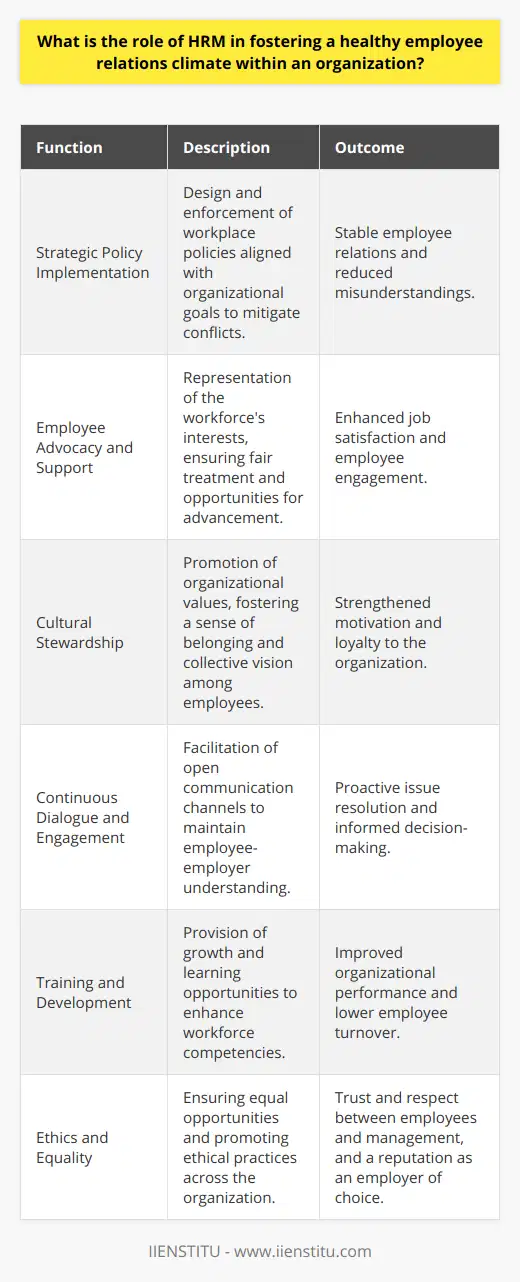
How do HRM policies and practices influence the nature and quality of employee relations?
Impact of HRM Policies on Employee Relations
Effective human resource management (HRM) policies and practices play a pivotal role in shaping the nature and quality of employee relations within an organization. By promoting a positive work environment and fostering open communication, HRM policies can significantly influence the way employees interact and relate to each other as well as to the management.
Inclusion and Diversity
Inclusive HRM policies ensure that employees from diverse backgrounds feel valued and respected in the workplace. These policies encourage a culture of diversity, where employees embrace the differences among their co-workers, leading to increased trust, reduced conflicts, and enhanced innovation.
Fair Treatment and Benefit Provisions
When HRM practices are impartial and consistent, they contribute to establishing a sense of fairness among employees. Ensuring equitable treatment, providing equal opportunities for growth, and offering competitive benefits help build loyalty, satisfaction, and commitment among the workforce.
Work-Life Balance
Policies that support work-life balance, such as flexible working hours, remote work options, and employee wellness programs, improve employee relations by promoting a healthy, stress-free, and compassionate work environment. Employees are more likely to be satisfied and engaged when they feel that their organization respects and supports their personal lives.
Conflict Resolution and Grievance Handling
Effective conflict resolution and grievance handling mechanisms are essential for maintaining healthy employee relations. By addressing workplace disputes through open and transparent communication, proactive measures, and impartial decisions, HRM policies can foster a harmonious atmosphere and prevent the escalation of conflicts.
Performance Evaluation and Feedback
Transparent and objective performance evaluation systems that provide constructive feedback, recognize achievements, and offer support for improvement play a crucial role in employee relations. Employees who feel valued for their work and are encouraged to enhance their skills are more likely to have positive relationships with their colleagues and supervisor.
In conclusion, HRM policies and practices have a profound impact on the nature and quality of employee relations. By emphasizing inclusion, fairness, work-life balance, conflict resolution, and performance evaluation, organizations can cultivate a positive and productive work environment that encourages effective collaboration, employee motivation, and overall success.
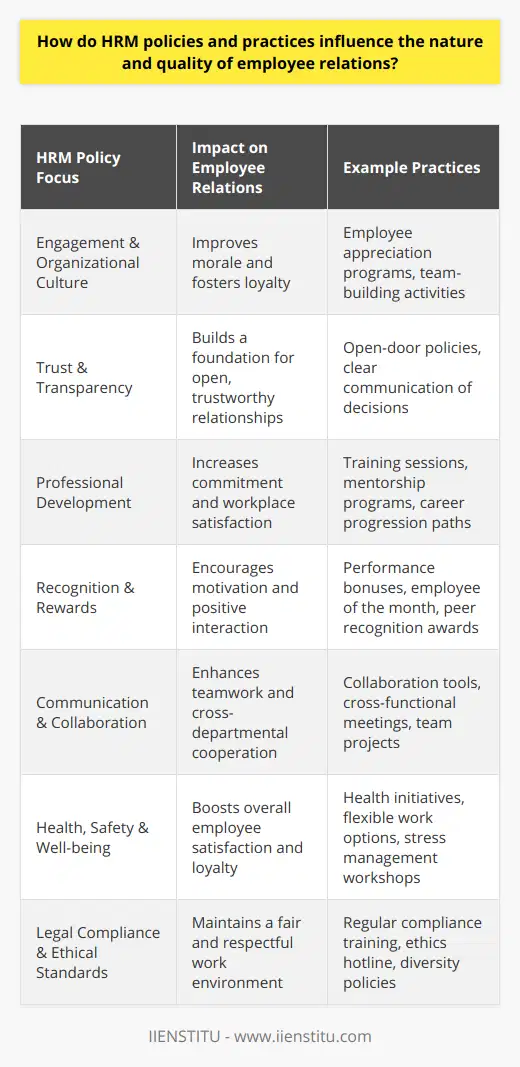
What are the key elements of an effective HRM strategy for addressing employee relations issues and conflicts in the workplace?
**Effective HRM Strategy Components**
To address employee relations issues and conflicts in the workplace, an effective Human Resource Management (HRM) strategy should incorporate several key elements. Firstly, cultivating open communication is essential in creating an environment that encourages the resolution of conflicts and issues. This can be achieved through regular feedback sessions, anonymous reporting systems, and fostering a supportive culture.
**Workplace Policies and Procedures**
Furthermore, having clear policies and procedures concerning workplace behavior, grievance handling, and conflict resolution is another critical aspect. These guidelines can help employees understand and navigate the appropriate steps for reporting and addressing issues, thus aiding in their timely resolution. Regularly reviewing and updating these policies can ensure they remain relevant and effective.
**Training and Development**
The HRM strategy should also prioritize training and development initiatives for both employees and managers. This helps create a better understanding of acceptable behaviors, conflict management techniques, and effective communication skills. Regular training and development programs can lead to improved interpersonal relations and reduced workplace conflicts.
**Performance Management**
Incorporating a robust performance management system is another essential component of an effective HRM strategy. Regular performance appraisals, feedback, and goal-setting can provide employees with a clear understanding of expectations, fostering accountability and reducing potential conflicts arising from misunderstandings or unmet targets.
**Inclusive and Diverse Work Environment**
Promoting an inclusive and diverse work environment is critical as well. Such an environment encourages understanding and respect among employees with different backgrounds, beliefs, and perspectives. This ultimately contributes to a stronger organizational culture and better employee relations.
**Employee Well-being and Support**
Lastly, an effective HRM strategy should focus on employee well-being and support through initiatives such as wellness programs and access to counseling services. A healthy and supported workforce is more likely to exhibit positive behavior, contributing to reduced conflicts and improved employee relations.
In conclusion, an effective HRM strategy should encompass open communication, clear policies and procedures, a focus on training and development, performance management, inclusivity and diversity, and employee well-being and support. Implementing these elements can lead to a better-managed workforce, with fewer employee relations issues and conflicts, ultimately promoting a healthier and more productive work environment.

Why is strong employee relations important for the overall health and productivity of an organization?
The Significance of Strong Employee Relations
Positive work environment: Strong employee relations is crucial for fostering a positive work environment. When employees feel connected and valued, they are more likely to be happy and engaged in their work.
Increased productivity: A positive work environment enhances productivity as happy employees are more likely to perform optimally, produce high-quality work, and contribute to team success in achieving organizational goals.
Reduced absenteeism: Maintaining strong employee relations helps reduce absenteeism and turnover because staff members are likely to feel more committed to their organization and satisfied in their roles. Satisfied employees tend to be more consistent in their attendance.
Improved problem-solving and communication: An organization that prioritizes strong employee relations encourages open communication and collaboration. This results in more efficient problem-solving, greater innovation, and the ability to address issues promptly, ultimately increasing the organization's overall performance.
Enhanced team dynamics: Organizations with strong employee relations tend to have better team dynamics, as these connections foster a culture of trust and respect among colleagues. This enables employees to work effectively, collaborate, and support each other towards the realization of common objectives.
Higher retention rates: A healthy relationship between employees results in higher job satisfaction, increasing employee retention rates. Low turnover translates to reduced costs associated with recruitment, hiring, and training new employees, thus benefiting the organization's bottom line.
Positive employer reputation: The way an organization treats its employees reflects on its reputation. A company that cultivates strong employee relations is likely to be regarded as a desirable place to work, attracting both prospective employees and potential clients or customers.
Conclusion: Strong employee relations play an essential role in the overall health and productivity of an organization. This can be achieved through open communication, fostering collaboration, and ensuring that employees feel valued and respected within the workplace. Ultimately, investing in strong employee relations enhances the organization's overall performance, reputation, and long-term success.
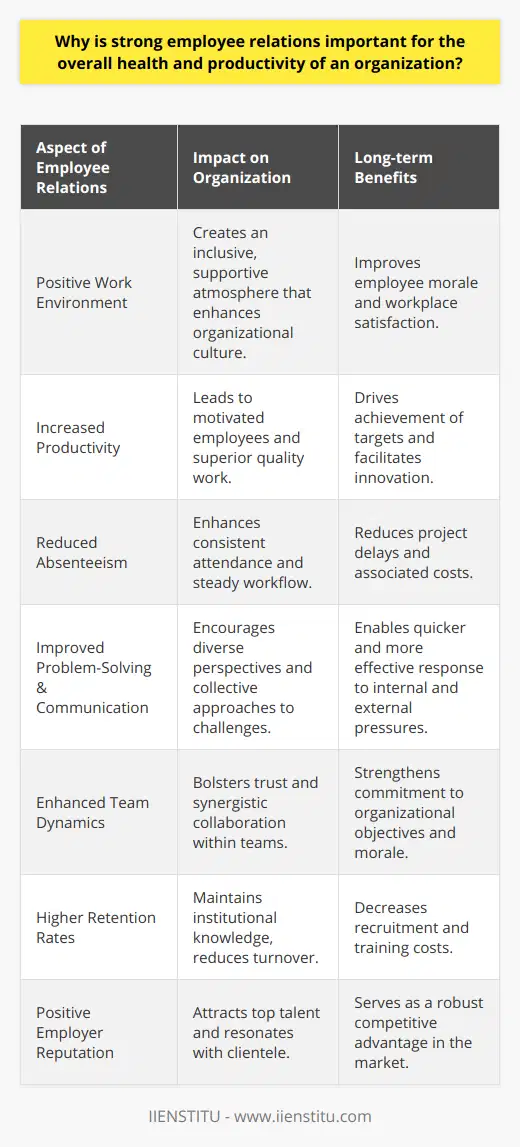
How does human resource management impact employee relations and contribute to conflict resolution in the workplace?
Human Resource Management's Role in Employee Relations
Human resource management (HRM) significantly affects employee relations and conflict resolution in organizations. HRM primarily focuses on managing human assets, creating a conducive work environment, and promoting the overall well-being of employees. By fostering open communication channels and providing platforms to handle employee grievances, HRM plays a vital role in maintaining healthy employee relations.
Promoting Open Communication
Effective communication is crucial in every organization for ensuring employee satisfaction and reducing conflict. HRM encourages open and transparent interactions by creating organizational structures and policies that enable employees to openly express their concerns. By implementing regular feedback mechanisms, HRM enables employees to share their opinions and ideas, contributing to an inclusive workplace.
Addressing Grievances
Handling employee grievances is integral to conflict resolution and maintaining positive workplace dynamics. HRM designs mechanisms to address complaints and concerns in a timely and organized manner. Through setting protocols and appointing responsible persons, HRM ensures employees feel heard, which helps prevent escalation of conflicts.
Providing Training and Development Opportunities
HRM conducts regular training programs and development workshops that not only boost employee morale but also enhance their soft skills. These initiatives impart valuable communication practices and teamwork abilities, fostering better interpersonal skills among employees. Consequently, an equipped workforce can effectively manage conflicts and maintain harmonious relations in the workplace.
Implementing Conflict Resolution Strategies
HRM designs and implements conflict resolution strategies to ensure a congenial work environment. By working proactively to identify signs of discord, HRM can mitigate conflict and enhance employee relations. Strategies, such as mediation and arbitration, provide structured ways to resolve disputes and nurture workplace relationships.
Monitoring Performance Evaluation
Performance evaluation plays a significant role in employee relations by creating a fair and unbiased system for assessing employees. HRM ensures evaluations are based on objective criteria, allowing employees to feel valued and motivated. By establishing a well-balanced appraisal system, HRM encourages healthy competition, minimizing the potential for conflicts.
In conclusion, human resource management is pivotal in shaping employee relations and contributing to conflict resolution. Through implementing effective communication channels, addressing grievances, providing training opportunities, and monitoring performance evaluations, HRM creates a positive work environment where employees are more likely to achieve their potential and engage in cooperative relationships.
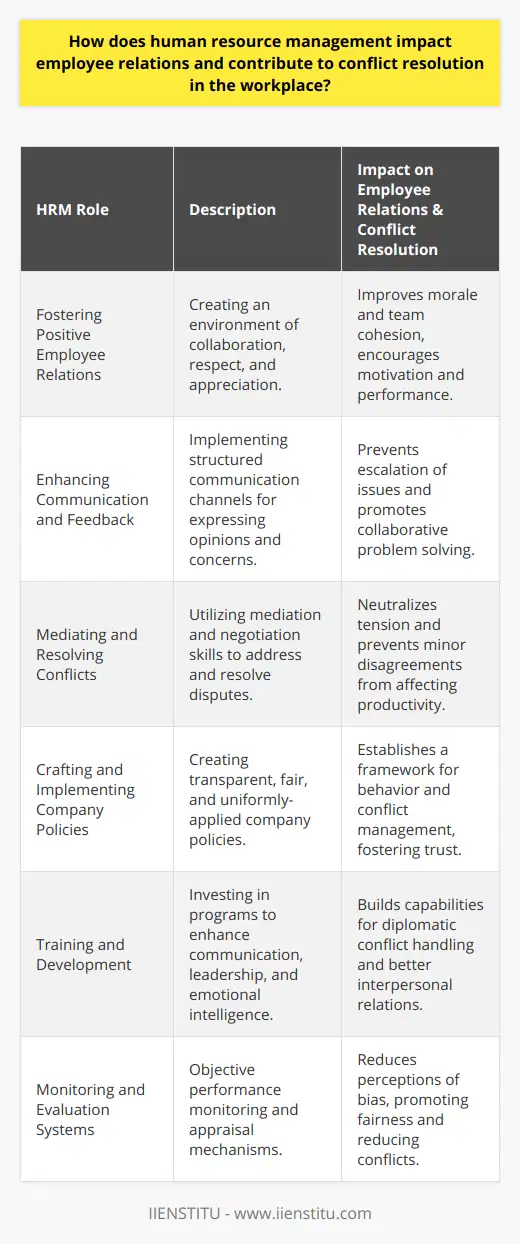
In what ways can HRM policies support and enhance employee relations to foster a positive work environment and reduce employee turnover?
Enhancing Employee Relations through HRM Policies
Effective HRM policies can greatly support and enhance employee relations to foster a positive work environment and reduce employee turnover. Specifically, these policies can positively impact an organization's culture, communication, and employee engagement through the following approaches:
Promoting a Strong Organizational Culture
Cultivating a strong and inclusive organizational culture is crucial for fostering healthy employee relations. Human Resource Management (HRM) policies can facilitate this by ensuring that the company's values, mission, and vision are well-articulated and communicated to employees. Moreover, HRM practices such as onboarding, employee recognition, and diversity initiatives can create a positive work culture where employees feel connected, respected, and valued.
Encouraging Open Communication
Open lines of communication contribute significantly to robust employee relations, leading to increased job satisfaction and reduced turnover. HRM policies can support this by establishing clear communication channels, such as regular meetings, feedback mechanisms, and collaboration tools, that enable employees to freely express their opinions, voice concerns, make suggestions, and engage in constructive dialogue with their peers and supervisors. This transparent environment promotes trust and collaboration among team members, contributing positively to workplace harmony.
Boosting Employee Engagement
Engaged employees are more likely to stay with the organization, positively impacting retention rates. HRM policies can support employee engagement by offering training and development opportunities, allowing employees to continuously acquire new skills, and grow within their roles. Additionally, well-designed performance management systems can be highly effective in motivating and retaining employees by providing regular feedback, setting challenging yet realistic targets, and aligning individual goals with the organization's objectives.
Recognizing and Rewarding Contributions
Employee recognition and rewards can substantially improve employee relations by demonstrating that the organization values and appreciates their efforts. HRM policies can facilitate this by implementing performance-based incentives, celebrating team accomplishments, and offering non-monetary rewards such as flexible work hours, recognition in company newsletters, or opportunities to attend training sessions, seminars, and conferences.
Providing Work-Life Balance Opportunities
Finally, HRM policies that allow for a healthy work-life balance contribute significantly to employee satisfaction and commitment. Offering flexible work arrangements, such as telecommuting, reduced hours, or job-sharing, can support employees' personal lives and help them feel more engaged and satisfied in their work.
In conclusion, by promoting a strong organizational culture, encouraging open communication, boosting employee engagement, recognizing and rewarding contributions, and providing work-life balance opportunities, HRM policies can powerfully contribute to enhancing employee relations. In turn, a positive work environment can be fostered, leading to reduced employee turnover and increased organizational success.
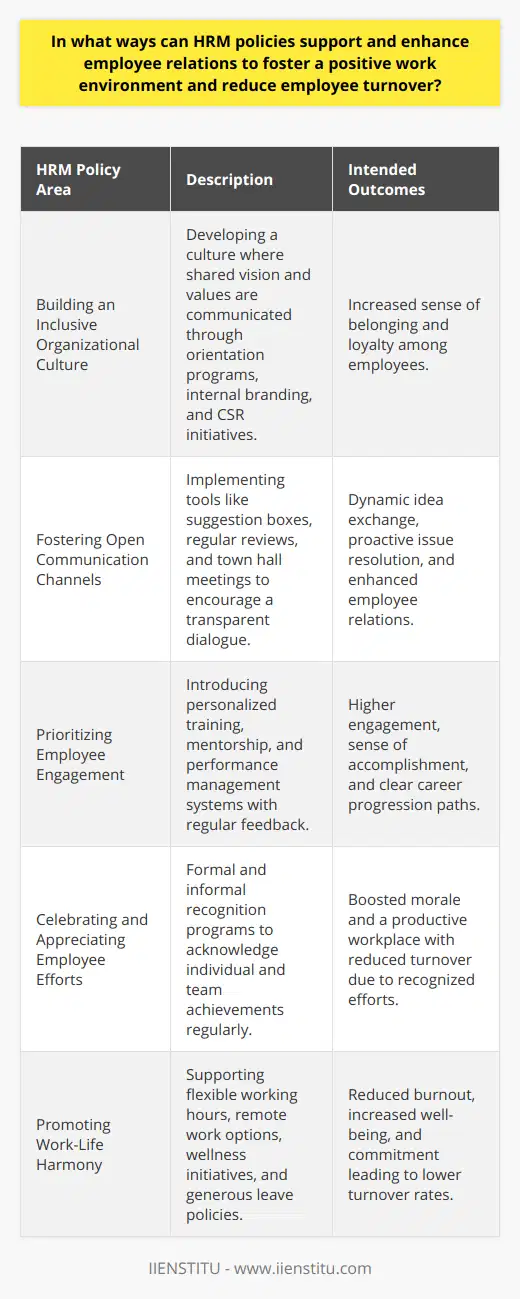
Why is strong employee relations important for achieving organizational goals?
Significance of Employee Relations
Strong employee relations play a vital role in achieving organizational goals, as they facilitate a cohesive work environment. By fostering healthy relationships among team members, organizations can enhance employee engagement and productivity.
Employee Satisfaction and Retention
One of the main reasons strong employee relations is essential for achieving organizational goals is its direct impact on employee satisfaction. A satisfied workforce tends to be more committed to their roles and motivated to achieve their targets. In turn, this leads to a decrease in employee turnover, which is critical for maintaining a stable workforce that can focus on accomplishing long-term goals.
Collaboration and Teamwork
Effective employee relations also encourage collaboration and teamwork, which contributes to organizational success. A harmonious work environment is conducive to idea-sharing and open communication, allowing team members to work together, maximize their potential, and achieve common objectives. Improved interpersonal relationships inspire trust and mutual respect, ultimately fostering innovation and problem-solving capabilities necessary for overcoming challenges and reaching goals.
Conflict Resolution
Strong employee relations are critical for effective conflict resolution, as they can prevent minor disagreements from escalating into larger issues. By addressing potential problems in a timely manner, organizations can create a harmonious work environment that promotes employee well-being and productivity. Efficient conflict management also reinforces organizational values, fostering a culture where team members feel valued and respected.
Positive Organizational Culture
Lastly, robust employee relations contribute to creating a positive organizational culture. As employees feel supported and valued, their loyalty and commitment to the organization tend to increase. A positive culture not only helps attract top talent but also reinforces employee motivation, both of which are essential for achieving organizational goals.
In conclusion, ensuring strong employee relations is of utmost importance for organizations striving to reach their objectives. By enhancing satisfaction, promoting teamwork, facilitating conflict resolution, and fostering a positive culture, organizations can create a high-performance work environment that drives success.
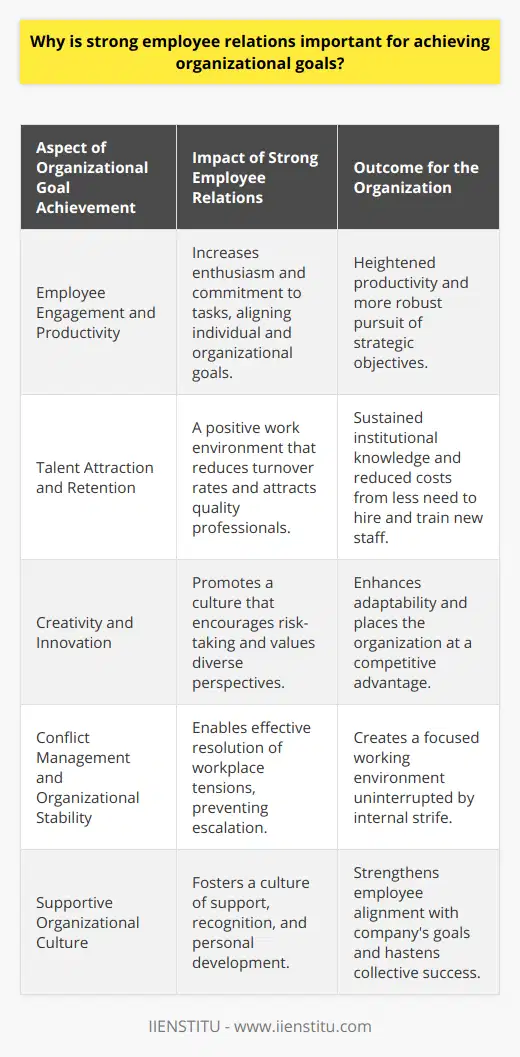
What gave rise to the field of employee relations and how has it evolved over time?
Origins of Employee Relations
The field of employee relations emerged in response to the rapid industrialization and urbanization of the late 19th and early 20th centuries. During this time, businesses expanded and employment relationships became more complex, necessitating a systematic approach to managing the workforce. The evolution of employee relations can be traced through several key developments that have shaped its current state.
Labor Unions and Collective Bargaining
One of the earliest influences on employee relations was the rise of labor unions. Workers formed these organizations to negotiate with employers collectively, seeking better working conditions, wages, and job security. Labor unions provided a platform for workers to voice their concerns, which led to the establishment of collective bargaining as a cornerstone of employee relations.
The Hawthorne Studies
The Hawthorne Studies, conducted in the 1920s and 1930s, marked a significant shift in the understanding of employee motivation and satisfaction. These studies revealed that social and psychological factors significantly influenced workers' productivity, highlighting the importance of fostering positive workplace relationships. This recognition led to the development of the human relations movement, which emphasized the role of communication, employee engagement, and workplace culture in managing employee relations.
Legislation and Regulatory Framework
Throughout the 20th century, various governments enacted labor laws and regulations that shaped employee relations practices. These laws addressed issues such as minimum wage, working hours, safety standards, and anti-discrimination policies. Consequently, organizations had to comply with these regulations and adapt their employee relations strategies accordingly.
The Emergence of Human Resource Management
In the latter part of the 20th century, the field of human resource management (HRM) emerged as a more comprehensive approach to managing employees, incorporating recruitment, training, performance management, and employee welfare. Employee relations began to be viewed as a subset of HRM, focused on maintaining positive relationships between employers and employees to ensure a harmonious work environment.
Current Trends and Challenges
Recently, the concept of employee relations has continued to evolve in response to contemporary challenges and trends. In a globalized and increasingly diverse workplace, issues such as cultural sensitivity and equal employment opportunities have gained prominence. Additionally, advances in technology have led to new forms of communication and work arrangements, such as remote work, which require organizations to adapt their employee relations strategies to maintain productivity and employee satisfaction.
In conclusion, the field of employee relations has been shaped by various historical developments, ranging from labor unions and collective bargaining to the rise of human resource management. As the workplace continues to transform in response to economic, social, and technological trends, employee relations will undoubtedly continue to evolve to meet the needs of both employers and employees.
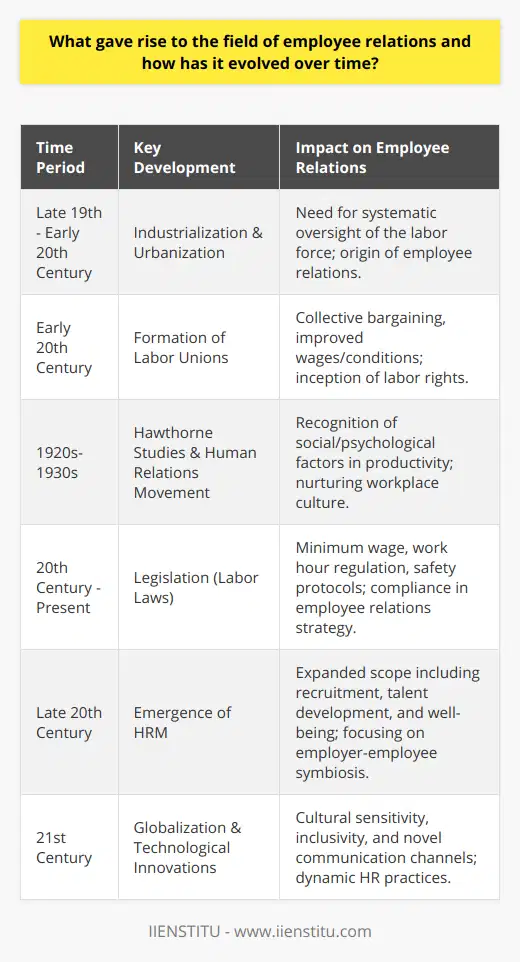
How does human resource management impact employee relations, and what strategies can HR professionals employ to foster a healthy workplace culture?
Impact on Employee Relations
Human resource management (HRM) plays a pivotal role in shaping employee relations by influencing workplace policies, communication, and overall work environment. HRM directly affects employee relations through policies and procedures, such as conflict resolution, training, and engagement programs, which can foster a sense of belonging and promote cooperation among employees. Moreover, open and transparent communication between HR professionals and employees is essential to building trust and improving employee satisfaction levels.
Strategies to Foster a Healthy Workplace Culture
Communication Enhancement
HR professionals can enhance communication by encouraging feedback and suggestions from employees. Adopting an open-door policy helps create an environment where employees feel heard and valued, thus promoting trust and camaraderie.
Training and Development Opportunities
Offering comprehensive training and development opportunities aids the continuous growth of employees. HR personnel must ensure that relevant programs are available to employees, focusing on both personal and professional skills, which may boost morale, reduce turnover, and facilitate better employee relations.
Recognition and Rewards
Implementing recognition and reward systems to honor employees' hard work and commitment showcases the company's appreciation, creating a culture of mutual support. Such programs can include employee-of-the-month awards, peer recognition initiatives, and spot bonuses.
Fair and Transparent Policies
Ensuring that workplace policies are clear, fair, and consistently applied across the workforce is essential in maintaining stable employee relations. HR professionals must routinely review and update policies to ensure compliance with legal requirements and evolving organizational values.
Diversity and Inclusion
Promoting diversity and inclusion through hiring, training, and policies cultivates a more accessible and dynamic workplace culture. Employees from diverse backgrounds contribute various perspectives, enabling creativity and innovation, leading to better problem-solving and decision-making processes.
Employee Health and Well-being
HR professionals must actively prioritize employee health and well-being by implementing initiatives such as flexible working arrangements, stress management programs, and access to mental health support. By prioritizing employee well-being, organizations can foster a positive work environment that supports employee engagement and retention.
In conclusion, effective human resource management greatly influences employee relations by shaping the work environment, communication, and policies. HR professionals can employ a range of strategies to create a healthy workplace culture, including enhancing communication, providing training and development opportunities, and prioritizing employee well-being. A supportive and inclusive workplace ultimately benefits employers and employees alike, leading to increased satisfaction, engagement, and overall performance.
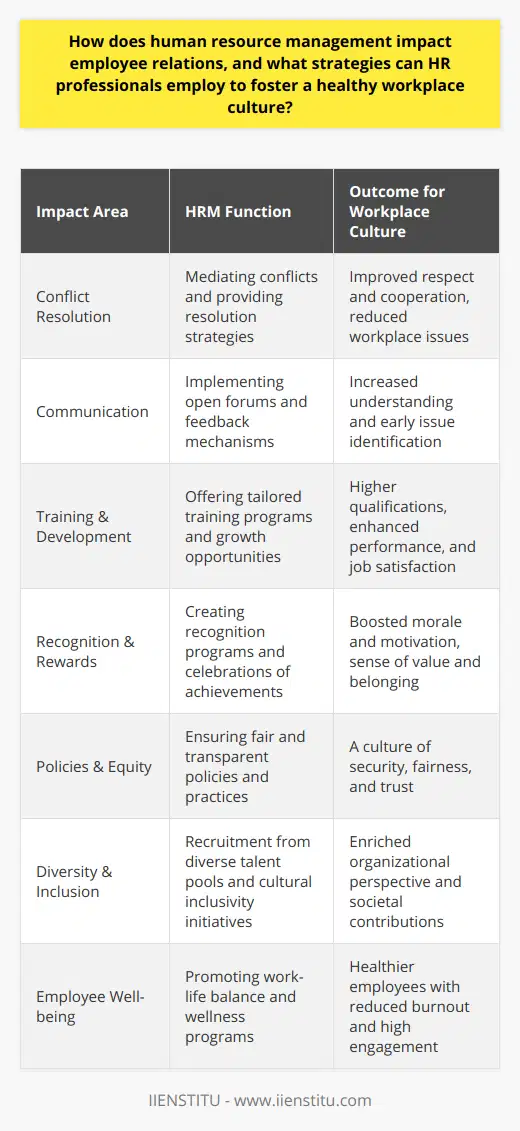
What is employee relations and its impact on organizations?
Employee Relations Defined
Employee relations is a multifaceted concept that refers to the management of interactions between employers and employees in an organization. It encompasses various practices, policies, and procedures employed to establish and maintain a positive work environment, contributing to better productivity, and overall success of an organization.
Significance of Employee Relations
Effective employee relations are crucial as they foster strong communication, promote employee engagement, and cultivate a collaborative working environment. Open and transparent dialogue between employers and employees ensures that both parties can voice their concerns, expectations, and suggestions. These exchanges facilitate better understanding of respective needs and allow for timely resolution of any issues that may arise.
Employee Relations and Performance
A healthy employee relations climate can lead to improved employee morale, reduced turnover, and increased job satisfaction. When employees feel valued, they are more likely to perform their duties to the best of their abilities, and be more engaged and committed to their organization. Such positive emotions in the workforce can result in increased overall productivity and higher performance indicators for a company.
Legal Aspects of Employee Relations
Adhering to and complying with employment laws is another important aspect of employee relations. Organizations must be aware of and comply with regulations governing various aspects of their interactions with employees, including wages, working hours, equal opportunity, and workplace safety. By maintaining such compliance, organizations can prevent potentially costly legal disputes and maintain a favorable reputation in the eyes of their employees and the wider business community.
Final Thoughts
In conclusion, employee relations play a crucial role in an organization's success and directly impact its productivity, reputation, and employee retention. By fostering open communication, addressing concerns, and complying with relevant legislation, organizations can create a positive and inclusive work environment where employees feel motivated, engaged, and valued. Ultimately, endeavors to maintain healthy employee relations benefit both the employees and their organizations, ensuring a harmonious and prosperous workplace.
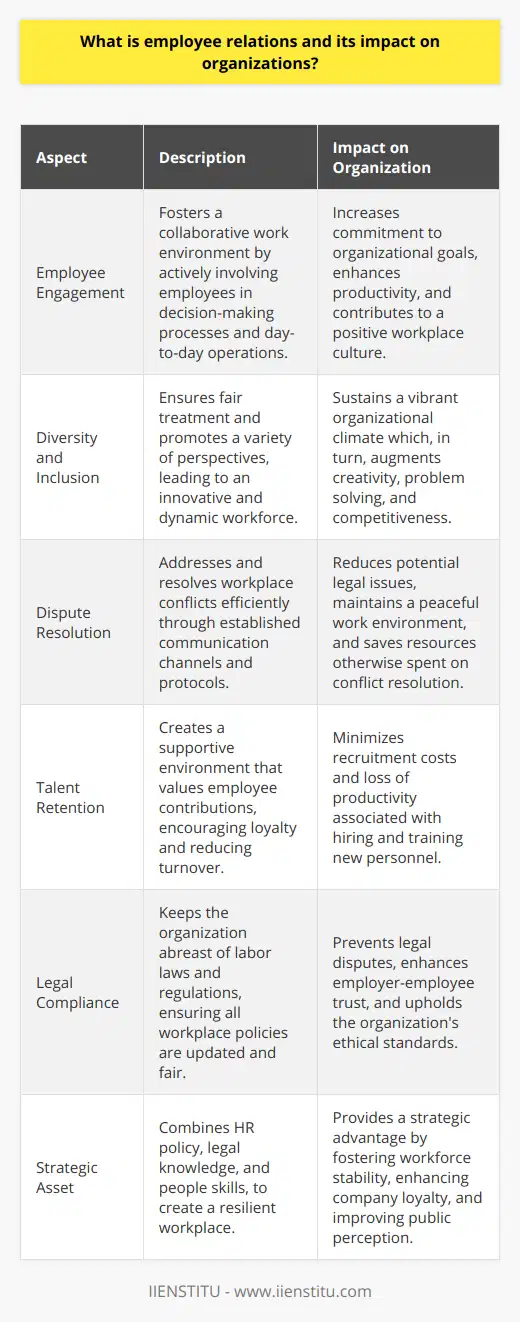
How does human resource management impact employee relations?
Impact on Communication and Collaboration
Human resource management plays a vital role in fostering employee relations by promoting a culture of open communication and collaboration within the organization. It achieves this by implementing practices such as regular feedback sessions, team-building exercises, and encouraging a friendly work environment. These activities contribute to the development of a healthy rapport among employees, leading to increased trust, problem-solving abilities, and overall efficiency.
Employee Motivation and Satisfaction
Additionally, effective HR management directly impacts employee motivation and satisfaction levels. By offering career development opportunities, competitive compensation packages, and recognition for hard work, HR policies support employees in meeting their personal and professional goals. Consequently, employees are more committed to their roles and feel valued for their contributions. This increased sense of job satisfaction fosters a robust work environment with lower turnover rates and higher employee engagement.
Conflict Resolution and Mediation
Another critical aspect of employee relations is conflict resolution and mediation. HR managers are responsible for addressing any issues that arise within the organization, either through direct intervention or by facilitating open discussions between the involved parties. By providing fair and effective solutions, HR ensures that conflicts are resolved in a timely and satisfactory manner. This proactive approach prevents the escalation of disagreements and maintains a harmonious work environment that enables employees to focus on their tasks.
Promotion of Diversity and Inclusion
In today's globalized work environment, fostering a diverse and inclusive culture is essential for healthy employee relations. Human resource management is responsible for implementing policies and initiatives that celebrate diversity, such as anti-discrimination and equal opportunity policies, as well as offering programs and training sessions that promote cultural awareness. These efforts not only ensure legal compliance but also enrich the organizational culture by celebrating diverse perspectives and capabilities, ultimately boosting employee morale and productivity.
In conclusion, human resource management has a significant impact on employee relations through its various functions and responsibilities. By proactively addressing the needs and concerns of employees, HR contributes to the creation of a collaborative, motivated, and diverse workforce. This leads to increased employee loyalty, reduced turnover, and overall enhanced organizational effectiveness.
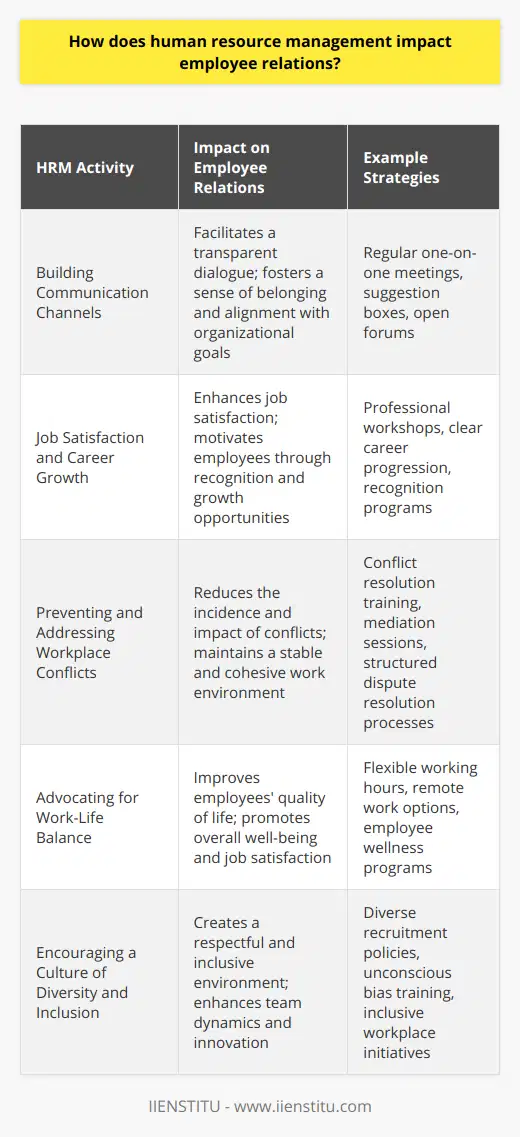
What gave rise to the field of employee relations?
Historical Context of Employee Relations
The field of employee relations emerged during the early twentieth century, resulting from profound socio-economic changes that altered the relationships between employers, employees, and labor unions. These developments included the rise of mass production, which resulted in factory work replacing skilled craftsmanship as the primary mode of employment. Consequently, workers transitioned from having individual relationships with their employers to being anonymous members of larger labor forces.
Role of Industrialization
Industrialization played a significant role in the birth of employee relations as it gave rise to both positive and negative consequences in the workplace. With the increase in production, many employees experienced improved living standards due to better wages and job opportunities. However, simultaneously, working conditions for many factory workers became harsher, with deteriorating safety, long hours, and exploitative practices. This environment led to the labor movement's emergence and increased worker demands for fair treatment, thereby necessitating the management of employee relationships.
Labor Unions and Legislation
To address workers' grievances, labor unions began forming as early as the nineteenth century, striving for better working conditions, fair pay, and employee rights. These unions gradually gained power, compelling both governments and employers to address workers' demands. Subsequently, governments enacted labor laws that established minimum wages, working hour limits, and safety standards. While these legislations contributed significantly to shaping employee relations, they also made way for the formal interaction between employers, employees, and unions, leading to additional avenues for conflict resolution.
Inclusion of Human Resource Management
As the field of employee relations continued to evolve, the role of human resource management became increasingly critical in managing workplace issues. Modern organizations started recognizing employees as valuable resources with skills, talents, and aptitudes that could be harnessed for collective success. This era witnessed a shift from a focus on industrial relations and labor unions to employee engagement, motivation, and satisfaction. Consequently, human resource management began incorporating employee relations practices, such as open door policies, grievance handling, and mediation processes.
Conclusion
In summary, the emergence of employee relations as a distinct field can be traced back to the socio-economic changes brought by industrialization, the rise of labor unions, legislative advancements, and the integration of human resource management. Today, employee relations encompasses various aspects of employer-employee dynamics, such as collective bargaining, conflict resolution, workplace communication, and employee engagement. As the global labor landscape continues to evolve, the field of employee relations will undoubtedly remain vital for enhancing organizational success and maintaining harmonious workplace environments.
